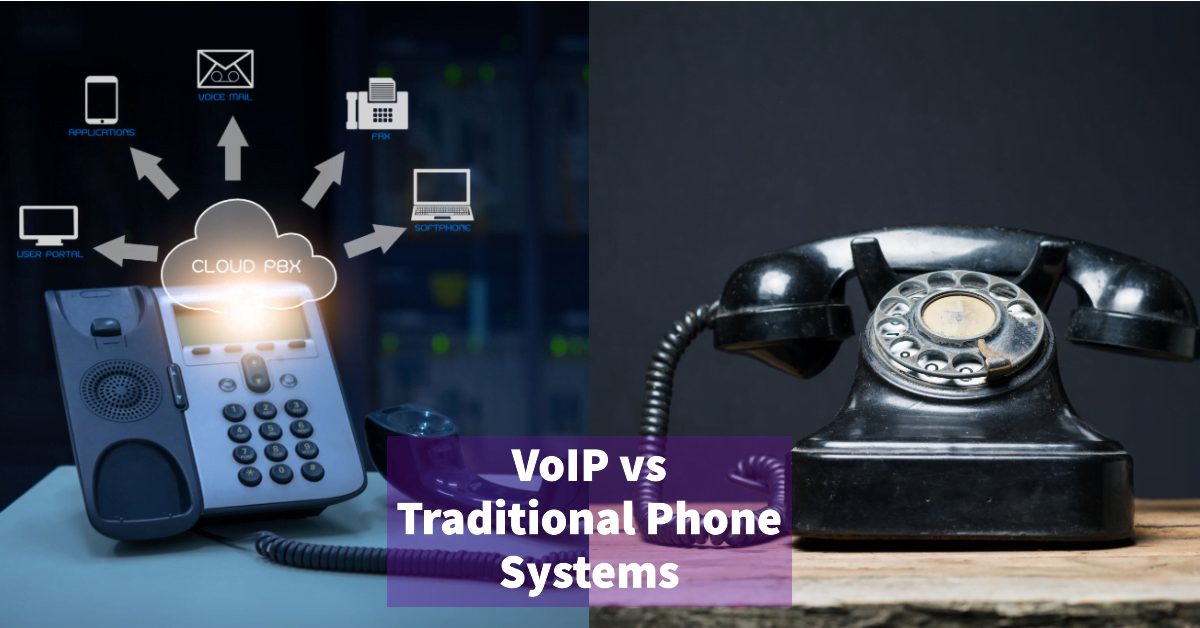
VoIP vs Traditional Phone Systems: Making the Right Choice
As a business owner, selecting the right phone system for your organisation is a crucial decision. With the rise of Voice over Internet Protocol (VoIP) technology, you may be wondering whether to choose a VoIP system or stick with a traditional phone system.
What is VoIP?
Voice over Internet Protocol (VoIP) is a technology that allows users to make phone calls over the internet, rather than through traditional telephone lines. VoIP systems convert voice signals into digital data, which is then transmitted over the internet. VoIP has become increasingly popular among businesses due to its cost savings, flexibility, and advanced features.
What is a Traditional Phone System?
Traditional phone systems, also known as Public Switched Telephone Networks (PSTN), rely on copper wires to transmit voice signals. These systems have been in use for decades, and while they have a proven track record of reliability, they may lack the features and flexibility that modern businesses require.
Comparing VoIP and Traditional Phone Systems
Cost
One of the main advantages of VoIP systems is their potential for cost savings. With VoIP, you can avoid the expensive line rental fees associated with traditional phone systems. Additionally, VoIP calls are generally cheaper, especially for long-distance and international calls. It's also worth noting that many VoIP providers offer flat-rate pricing, which can help businesses better predict their monthly expenses.
On the other hand, traditional phone systems often require higher upfront costs for installation and equipment. Furthermore, ongoing line rental fees and per-minute call charges can make traditional systems more expensive in the long run.
Flexibility
VoIP systems offer greater flexibility than traditional phone systems. With VoIP, you can easily add or remove users as your business grows, without the need for additional physical lines. VoIP also allows for remote work and mobile integration, enabling employees to stay connected no matter where they are. (Read: remote-work-security-tips)
In contrast, traditional phone systems are often limited by the number of physical lines available. Expanding the system can be time-consuming and costly. Remote work capabilities are also limited, as employees typically need to be at their desks to use the system.
Features
VoIP systems come with an array of advanced features that can enhance business communications. Some common VoIP features include:
- Call forwarding
- Voicemail-to-email
- Video conferencing
- Auto-attendant
- Call recording
While traditional phone systems may offer some of these features, they are typically more limited and may require additional costs to implement.
Reliability
Traditional phone systems are known for their reliability, as they are not dependent on an internet connection. However, this can also be a disadvantage, as traditional systems are more susceptible to service disruptions due to physical damage to the lines.
VoIP systems rely on a stable internet connection, which means that call quality can be affected by factors such as bandwidth and network congestion. However, with a robust and well-managed network, VoIP systems can offer excellent call quality and reliability. (Read: optimising-your-smb-network-performance)
Making the Right Choice for Your Business
When choosing between VoIP and traditional phone systems, consider your business's needs, budget, and future growth plans. VoIP systems are generally more cost-effective, flexible, and feature-rich than traditional phone systems, making them an attractive option for many small and medium-sized businesses.
However, if your business relies on a highly stable and reliable phone system, and you are not as concerned with advanced features or cost savings, a traditional phone system may be the better choice for you.
Before making a decision, assess your current and future communication needs, and consult with a trusted IT support provider to help you determine the best solution for your business. Kwik Support offers comprehensive IT support services that can help you navigate the complexities of choosing and implementing the right phone system for your organisation.
It's also important to consider the quality of your internet connection when evaluating VoIP systems. A slow or unreliable internet connection can lead to poor call quality and dropped calls. Upgrading your internet connection or optimising your network can help mitigate these issues. (Read: how-to-secure-your-wireless-network)
In conclusion, both VoIP and traditional phone systems have their benefits and drawbacks. VoIP systems generally offer cost savings, flexibility, and advanced features, making them an appealing choice for many small and medium-sized businesses. Traditional phone systems, while less feature-rich and more expensive, may offer greater reliability for businesses that prioritise stability.
By carefully evaluating your business's needs and consulting with an IT support provider, you can make an informed decision and choose the right phone system to support your organisation's growth and success.
